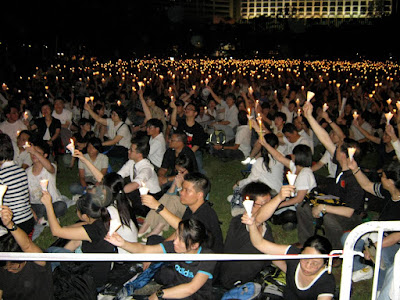Watch Hong Kong
Bits and Pieces 2019-06-09
Summary:
I no longer visit Hong Kong regularly, as I once did, so it has fallen off my blog. But the coincidence of the 30-year anniversary of the Tiananmen massacre and the massive protests over the prospect of a law allowing extradition to mainland China are too important to let pass without a mention--especially in the current US political climate. China is attempting to rewrite the history of June 4, 1989, at an unprecedented scale and with unprecedented success. One of the strangest days of my traveling life was June 4, 2009, the 20th anniversary of the Tiananmen massacre. I awoke in Shantou on the mainland, where I had given a talk at a university the day before. A normal day, both at the university and at the airport. When I arrived in Hong Kong the air was alive with protest and remembrance. I attended the events in Victoria Park that night, and blogged about how far US universities would go toward self-censorship to avoid offending their Chinese benefactors. Here is my photo of that evening. America should stand with the million people of Hong Kong who turned out to protest the extradition law. The separate legal system of Hong Kong notwithstanding, that law would surely be used to imprison or execute, under Chinese law, those in Hong Kong that the mainland labels as guilty of vaguely defined crimes against public order or societal harmony. Including American college professors attending June 4 memorials, as I did a decade ago. Of course, were such a thing to happen to Americans, the US government would probably come to their aid with the same vigor it has shown in holding Saudi Arabia accountable for the murder in Istanbul of US permanent resident Jamal Khashoggi. America, watch Hong Kong. The struggle between free and authoritarian government is playing out there in front of our eyes, and there is little reason to think that the US government, infatuated as it is with authoritarian regimes, cares much who wins.
It is reported that the protests were muted this year, as the countermeasures were stronger than ever--vigorous Internet censorship, and rounding up dissidents before the date of the event, rather than responding to actual protests. And of course no one under the age of 35 remembers those events first hand. I attended a panel about June 4 at Harvard recently, at which a Chinese student asked why the panelists should be believed, since the government insisted that the events they described never occurred--no one was killed, and a small number of counterrevolutionaries were responsible for the myth that this was an organic, large scale student movement in pursuit of basic rights.
America, watch Hong Kong. We don't want a state-run TV network, as the US president has proposed, rewriting history to the liking of the powers that be.
The courageous Rowena He, who was present for the massacre and has devoted her life to preserving its memory, has written three columns to mark the occasion. In the Guardian, she has published a compelling short narrative, China continues to deny Tiananmen, but we won't let the world forget.
It speaks in the voices of some of the participants, documenting China's efforts to falsify the record. She has also published Surviving Tiananmen: The price of dissent in China, in the Nation, and False Identity? Forced Identity? Taiwan in China's post-Tiananmen nationalism, in the online magazine of the Taiwan Studies program and the University of Nottingham. It is not easy to write on such subjects.
